-
Jewish Life
-
The SIG
-
- Media Contact Donate Report incident
The Breslau Rabbinical Seminary’s important library was largely destroyed in 1938. What remained of its contents, discovered after the war and known as the «Breslauer Schriften», arrived in Switzerland in 1950. The SIG and ICZ have now launched plans to restore these precious volumes.
The important Rabbinical Seminary in Breslau, now known as Wrocław in Poland, and its library were largely destroyed in the November pogroms of 1938. Part of its valuable collection had already been stolen by the Nazis in order to document the «decline of the Jewish race». After the war ended, the Allies discovered the library’s remaining holdings, known as the «Breslauer Schriften» («Breslau writings»), in a depot in Wiesbaden. In 1950, around 6'000 of these books arrived in Switzerland and were donated to the SIG. They are now to be restored and made accessible to the public with support from the City and Canton of Zurich.
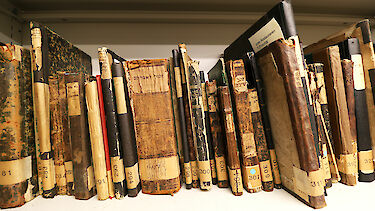
Establishment and purpose of the Breslau Rabbinical Seminary
The Jewish Theological Seminary in Breslau was founded in 1854. It grew out of the Fraenckelsche Stiftung established by Jonas Fraenckel (1773–1846), and served as a centre for the training of rabbis and religious scholars. The library associated with the Seminary housed literature pertaining to the Torah and Talmud, alongside works of classical literature, philosophy, philology, astronomy, mathematics and Christian writings in Hebrew and German. The Seminary became a lively site of teaching and learning and developed into one of the most important institutions for Jewish education in Europe, alongside the «Hochschule für die Wissenschaft des Judentums» in Berlin («Higher Institute for Jewish Studies»).
The partial destruction of the library in the November pogroms of 1938 and a Nazi ban on teaching activities ultimately forced the Breslau Rabbinical Seminary to close. At the time, the library boasted a collection of around 30'000 to 40'000 books, with all but 11'000 volumes being destroyed.
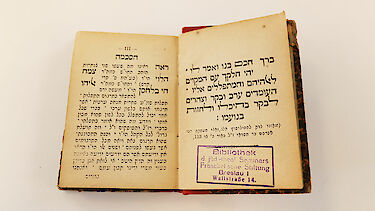
Systematic destruction and Nazi pseudoscience
In May 1933, a few months after the Nazis came to power, entire libraries and public and private collections of books – primarily of Jewish origin – were burned in a large-scale campaign. The declared aim of the book-burning was to fully extinguish Jewish collective memory.
By contrast, under the leadership of Nazi ideologue Alfred Rosenberg, the Nazis continued to steal Jewish books and cultural artefacts across their entire area of occupation. Rosenberg was charged by Adolf Hitler with the establishment of a «Advanced School» on the banks of Lake Chiemsee – an elite Nazi university for research, teaching and education in the spirit of National Socialism – using the books and cultural artefacts that had been stolen. Another branch was established in Frankfurt am Main in 1939. The collections stored here, including what remained of the Breslau library, were hugely important to the Nazis’ pseudoscientific research.
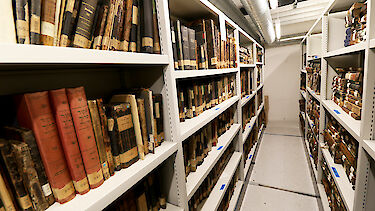
Taking stock of destroyed and stolen cultural artefacts after the war
In 1945, the advancing Allied troops discovered extensive holdings of Jewish cultural heritage within Germany. This led to the foundation of the New York-based «Jewish Cultural Reconstruction, Inc.» JCR in 1946. The organisation sought to return the stolen books and artefacts to their rightful owners.
In 1949, the JCR depot at the Landesmuseum Wiesbaden held around 11'000 of the 30'000 volumes originally stocked by the Breslau Rabbinical Seminary. Jewish philosopher Hannah Arendt was head of the JRC from 1949 to 1952. Her remit included the systemic acquisition and distribution of the stolen goods.
Switzerland was soon deemed an appropriate place for what remained of the Breslau library, as this was the only country in Europe where the German-speaking Jewish community had survived. This also posed the question of where Jewish culture should be rebuilt. In the late 1940s, Arendt contacted the officials in charge of the SIG. There was huge interest in the «Breslauer Schriften» in Zurich. Around 6’000 volumes arrived in Switzerland in 1950 and were given to the SIG. A further 5’000 books made their way to Israel and the US.
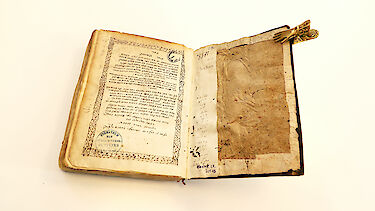
The «Breslauer Schriften»: testament to a once-blooming Jewish culture
The «Breslauer Schriften» are not just an important cultural legacy – they also bear testament to the Nazi regime’s attempt to destroy Judaism and Jewish culture in Europe. This makes what remains of the once-mighty library another «survivor» of the Holocaust. It is both living evidence of the thriving Hebrew culture that existed in German-speaking countries before World War II, and a testament to German-Jewish assimilation. This makes the Breslau collection particularly valuable as a unit.
The oldest volumes in the Swiss holdings date back to the 16th century. Many books contain handwritten material, notes, additions and dedications. Some are so rare that they cannot be found in any other library – making them the sole editions still in existence worldwide.
As it was initially not possible to agree on a location for the library, the volumes were split between the three Jewish communities in Zurich, Basel and Geneva. Since 2017, all of the books have been kept in the ICZ library. Bringing them together allows them to be stored properly and catalogued extensively.
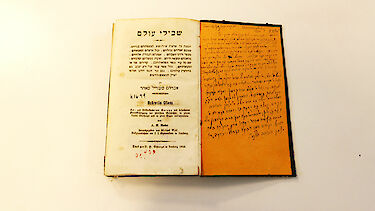
SIG initiates restoration project in collaboration with the City and Canton of Zurich
The history and significance of the «Breslauer Schriften» entail a responsibility on the part of the SIG, the ICZ and society. The majority of the books are in need of extensive restoration. As the SIG and ICZ cannot handle the cost- and labour-intensive restoration project themselves, a declaration of intent was submitted to the Directorate of Justice and Home Affairs of the Canton of Zurich and the Mayor of Zurich in June 2022. In this declaration, the two organisations announced their intent to preserve and maintain the holdings in the ICZ library and to make them accessible to the public.
A preliminary project launched in summer 2023 is intended to clarify the financing and prerequisites necessary for the restoration. The core aspect of the preliminary project is an assessment investigating the status of the «Breslauer Schriften» from a legal, historical and political perspective. It is set to deal with the complex issue of the origin of the holdings and the circumstances of their donation to the SIG in 1950. The findings of the preliminary study should be available in 2024.
Images: SIG